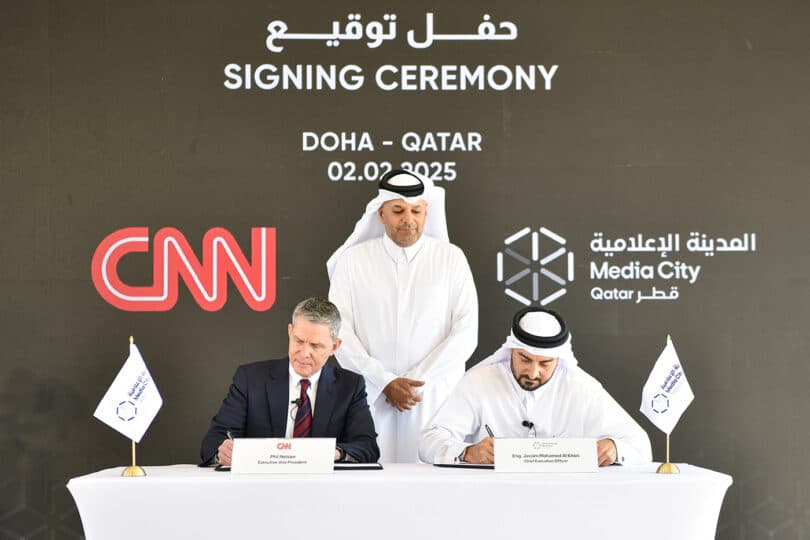CNN Criticized for ‘Cringe’ Attempt To Reach Younger Viewers With New Show Based in Qatar
The network insists it retains full control of the program’s content but critics point to the nation’s poor human rights record and its hosting of the terrorist group Hamas.

CNN is getting roasted over its attempt to reach Gen Z viewers and break into the so-called “creator economy” by hosting a show in a shiny new office at Doha, Qatar.
The cable network’s international division launched the weekly show last week hosted by several of its younger journalists rather than its marquee talent. It says the show will “focus on news-adjacent topics and stories that feel real, relevant, and relatable.”
The decision to situate the show in Doha, however, has made it the object of mockery and criticism.
CNN International insists the program is not sponsored by Qatar, which is host to both a major American military base and the political leadership of the terrorist group Hamas. But it acknowledged to the Washington Free Beacon in February that the Gulf country would pay for “facilities and technical support.”
A promotional video shared on YouTube, titled “Meet the Creators,” features the co-hosts – Antoinette Radford, Ivana Scatola, Bijan Hosseini, and Matias Grez – as they explore Doha shortly after moving to Qatar.
One clip shows the co-hosts excitedly walk through the city’s Souq Waqif market and try out “traditional Qatari” perfumes.
Mr. Hosseini describes himself as “charming, charismatic – obviously – and humble.”
“That’s a lot of perfume,” Mr. Hosseini says in the clip. Ms. Radford responds, “There’s a lot of smells right there.”
In the first episode, Mr. Hosseini says he wants the co-hosts to discuss “zeitgeist things, which is a fun word, but it’s trendy, what’s popular, what you talk about over dinner.”
Mr. Grez says he did “a lot of crying” before moving to Qatar.
The first episode of the show has been posted on YouTube, along with a promotional video on YouTube’s “Shorts” section. Both have been criticized by viewers for failing to point to Qatar’s problematic human rights record and its support for Hamas.
“Qatar is paying media to sponsor content and that’s [why] media are forced to publish pro-Hamas content all the time,” one user wrote.
Another viewer wrote, “Stop having Qatar sponsoring you and force you to report pro-Hamas narrative. Qatar does this with all media.”
Others describe the content as “cringe” and “infantilizing.”
“My algorithm has failed me,” one user said.
Journalist Natalie Jarvey wrote in her newsletter Like & Subscribe that the co-hosts attended a “two-week bootcamp where they learned how to host a live show,” and met with CNN “legends” Christiane Amanpour and Becky Anderson.
Ms. Jarvey notes that the co-hosts are supposed to be “reporting news stories throughout the week that can live across YouTube, TikTok and CNN.com.”
“One of the challenges for CNN will be to find the balance between upholding its reputation for rigorous journalism with the looser, more direct style that tends to appeal on platforms like TikTok,” she said.
It is the part about finding the balance between “rigorous journalism” and filming in the new office space at Doha that is raising questions online.
Middle East analysts have pointed out that the establishment of Qatar’s “Media City” – which partners with international media outlets – was widely seen as a strategy to promote Qatar’s interests and bolster its public image.
After CNN’s deal with Qatar was announced, a senior fellow at the left-leaning Council on Foreign Relations, Elliott Abrams, told Jewish Insider, “We can be absolutely sure that coverage of Qatar’s foreign policy will be constrained from now on.”
He called the deal an “awful step” because “there is no freedom of the press” in Qatar.
Besides the online criticism, Puck’s Dylan Byers reported that even “some CNN insiders have questioned whether this was a quid pro quo with Qatar.”
CNN told Mr. Byers, “This is not sponsored content. We are working with Media City Qatar on the provision of facilities and technical support for our facility there. Anything related to CNN editorial content is fully controlled and funded by CNN.”
While CNN insists its editorial content is “fully controlled” by the network, observers have raised doubts. Qatar has a law that threatens to imprison “anyone who broadcasts, publishes, or republishes false or biased rumours, statements, or news, or inflammatory propaganda, domestically or abroad, with the intent to harm national interests, stir up public opinion, or infringe on the social system or the public system of the state.”
Qatar insists its “Media City” has a code of ethics and that it does not engage in censorship. However, critics have pointed to examples of coverage disliked by Qatar being censored.
In 2018, pictures surfaced of the New York Times International Edition, which showed that articles about LGBTQ issues had been deleted from the paper, with a notice that said they had been “exceptionally removed.”
A CNN spokesman told The New York Sun, “Editorial content from our Doha facility is fully controlled and funded by CNN and entirely independent, just as we operate anywhere else in the world. CNN Creators is not sponsored content.”

